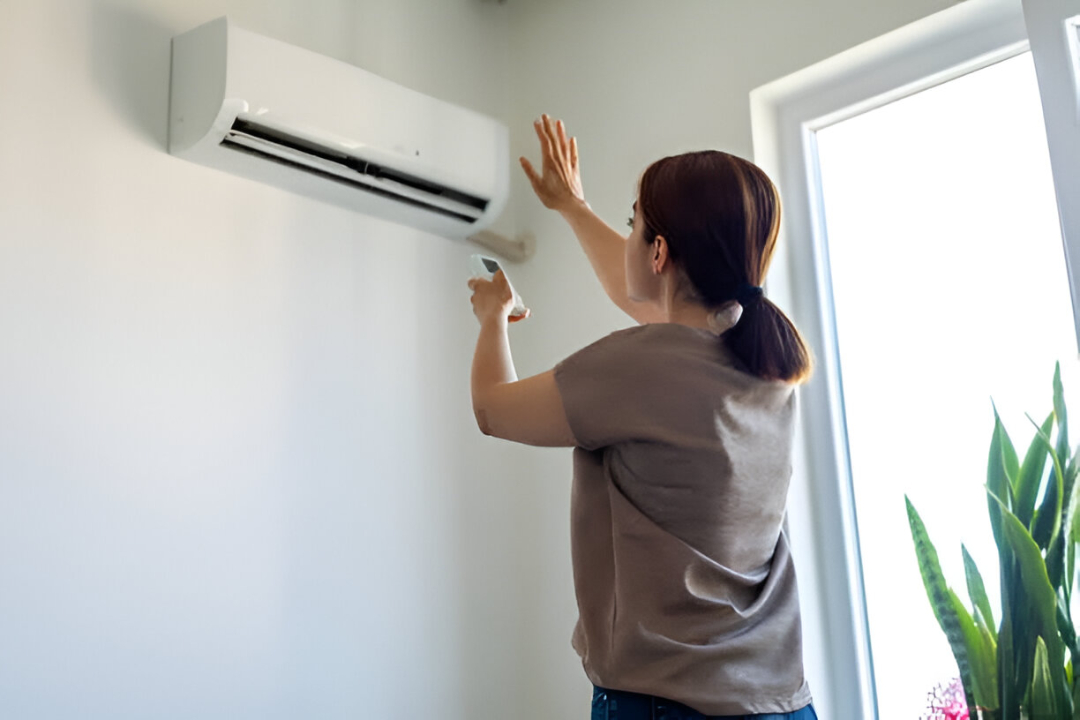Why isn’t my AC blowing cold air?” It’s a question many homeowners face, especially during scorching summer months, let’s break down the reasons why
When your air conditioner stops cooling and starts heating your home instead, summer becomes uncomfortable very quickly and unexpectedly frustrating. Many homeowners face the issue of their AC blowing warm air, especially during high-demand summer months in Delaware’s humid climate. Knowing what causes this problem helps prevent further system damage and saves money on emergency repairs and skyrocketing utility bills. In this guide, we’ll explore the most common causes and practical steps to take when warm air disrupts your comfort.
1. Thermostat Settings Might Be Incorrect or Accidentally Changed
Start by checking if the thermostat is set to “cool” and not “heat” or an incorrect fan-only mode.
Even a slight change in settings can result in your air conditioner not cooling throughout your home during the hottest days. Make sure the fan is set to “auto” and not continuously running without cooling the air first. It’s a simple but commonly overlooked issue that homeowners can often fix without needing professional assistance or costly repairs.
2. Dirty Air Filters Are Restricting Airflow and System Efficiency
Clogged or dirty air filters block airflow, causing the AC system to overheat and distribute warm air instead of cool. This forces the unit to work harder, reducing efficiency and leading to your AC blowing warm air unexpectedly indoors. Replace filters monthly during summer for optimal performance, cleaner air, and to prevent compressor-related system strain. If ignored, poor airflow can eventually lead to damage requiring professional servicing and part replacement from experienced technicians.
3. Low Refrigerant Levels Reduce Cooling Power and System Performance
Refrigerant is essential for heat exchange; low levels can’t absorb heat, which results in the air conditioning troubleshooting. Leaks or improper charging are usually the culprits and must be handled by certified professionals equipped with proper tools. You might also notice hissing sounds or ice forming on lines, both signs of refrigerant leakage within your system. Contacting our experts at Bigred Services ensures the leak is found, fixed, and refrigerant recharged to proper manufacturer specifications.
Also Read: Top 5 Signs Your Air Conditioner Needs Repair Before the Heat Hits
4. Outdoor Unit Is Dirty or Blocked by Debris and Plants
Your outdoor condenser unit plays a vital role in expelling indoor heat, which is essential for effective cooling. When this unit is covered in dirt, leaves, or debris, the system can overheat, causing AC blowing warm air. Keep at least two feet of clearance around it and wash off dirt buildup using a garden hose monthly.
5. Electrical Issues or Faulty Capacitors Prevent Proper System Cooling
If your system turns on but doesn’t cool, it could be due to blown fuses, faulty capacitors, or disconnected wiring. These electrical components control essential processes and can silently fail, leading to your AC blowing warm air without warning. You should never try to fix electrical HVAC problems without experience due to the risk of electric shock or further damage. Our Professionals are trained to troubleshoot and restore systems safely, ensuring your home stays cool and efficient.
Also Read: 4 warning signs your air conditioner needs repair
What Delaware Homeowners Should Do Next
When you notice your AC blowing warm air, don’t panic, start with basic troubleshooting steps and call for help if needed. Check your thermostat settings, replace your filters, and inspect the outdoor unit for obvious blockages or dirt buildup. If the problem persists, it’s time to contact a professional HVAC team to handle refrigerant issues, electrical repairs, or tune-ups. Delaware summers are no time to gamble with indoor comfort, acting quickly can save your system and your wallet too.
Call BigRed Services for expert advice, fast response times, and dependable air conditioning solutions across Delaware homes.


